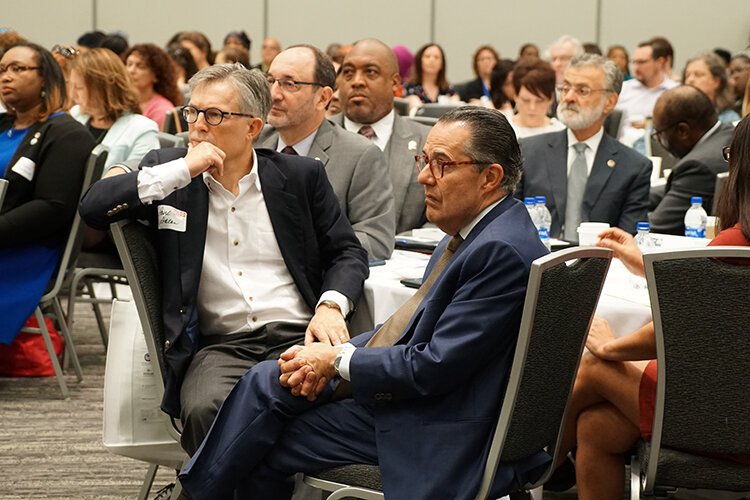Inside the Lead Safe Summit and the quest to save CLE kids from lead poisoning
 Lead Safe Summit attendees included Paul Dolan (United Way of Greater Cleveland’s Chairman of the Board of Directors and owner of the Cleveland Indians), Augie Napoli (President and CEO of United Way of Greater Cleveland), and Mayor Frank Jackson
Lead Safe Summit attendees included Paul Dolan (United Way of Greater Cleveland’s Chairman of the Board of Directors and owner of the Cleveland Indians), Augie Napoli (President and CEO of United Way of Greater Cleveland), and Mayor Frank Jackson
Cleveland's decades-long lead poisoning epidemic has dominated policy and community debates in recent years. The concern is warranted: Each day, four Cleveland children are poisoned by inhaling or ingesting lead dust, which is typically found in paint—putting our city's childhood lead poisoning rate at four times the national average.
The urgency around this topic informed the agenda and conversations that unfolded at the inaugural Lead Safe Home Summit, which took place on Friday, June 21, at the Huntington Convention Center.
Organized by United Way of Greater Cleveland in conjunction with the Lead Safe Cleveland Coalition (a public-private partnership of more than 100 organizations), the all-day event drew 500 registrants and combined calls for action with galvanizing inspiration.
"The aim [of the summit] was to make sure that everybody in the community—not just advocates, but everybody that is passionate about the issue—had an opportunity to learn more deeply about it [and] to connect with one another," says Andrew Katusin Jr., the director of basic needs at United Way Greater Cleveland. "We all have a role to play in solving this issue."
To that end, admission was free, and the convention center hallways between the main ballrooms and breakout rooms included a resource fair bringing together health insurance providers, the department of public health, and organizations such as MomsFirst.
An empowering keynote from Dr. Mona Hanna-Attisha highlighted her own role in blowing the whistle on Flint, Michigan's water crisis, and provided relevant inspiration for attendees. During a lunchtime panel, several representatives from other cities—including We the People of Detroit co-founder/activist Monica Lewis-Patrick and Coalition to Prevent Lead Poisoning program manager Elzabeth McDade—shared their insights about how their communities are working to tackle the lead poisoning epidemic.
Perhaps the summit's most effective offerings came via its many breakout sessions, which spanned the scientific and health-related ramifications of ingesting lead; tackling underlying root causes of poisoning (such as the racist housing policy known as redlining); and what community members can do about contaminated housing.
These small groups led to productive, illuminating discussions. For example, a session focused on nonpartisan engagement and encouraging constituents to vote became a dialogue in which people working in the field shared the obstacles and challenges they've faced with speakers.
Perhaps even more important, these sessions underscored that meeting people where they are—and making sure their voices are being heard at the table and brought into policy and community developments —is crucial to addressing the lead poisoning problem head-on. In fact, that so many people have been involved and engaged every step of the way already is heartening, says Daniel Cohn, Vice President of Strategy for the Mt. Sinai Health Care Foundation.
"One of the things I feel most encouraged by is that throughout the process, it has always been community-forward, partnership-forward," he says. "It feels like we're working on a whole suite of solutions that are co-created by people who are affected. That includes tenants, residents, property owners and landlords, all the nonprofits here, and others that are serving children and families impacted by lead."
Later in the day, the City Council’s Health & Human Services committee voted unanimously to move legislation out of committee that specifically addresses certifying rental units as lead safe, which United Way's Katusin views as a step in the right direction. However, he stresses that there are other ways to help. In fact, he's also encouraging anyone interested to join the Lead Safe Coalition, and notes their next meeting is August 9 at the Jerry Sue Thornton Center on the campus of Tri-C.
"That's really how we can stay engaged and keep the momentum going, is by going hand-in-hand with the coalition to support the long-term goal of making Cleveland lead safe," he says. "The Summit committee's hope is that this isn't a summit for the sake of a summit, [but] that there is real action that continues."
For more information on Lead Safe Coalition activities, follow the Twitter account @leadsafecle or join the email list by reaching out to info@leadsafecle.org.
This article is part of our ongoing "Roots of Change: Forging a More United Way" dedicated series in partnership with United Way of Greater Cleveland.
